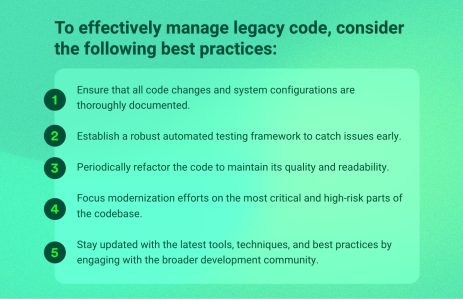Discover practical strategies and tools for modernizing legacy code, improving maintainability, reducing technical debt, and managing legacy code efficiently.
Legacy code tends to strike fear in the hearts of developers and IT managers. This non-performant, poorly documented code is causing an innovation standstill. Keeping all these old systems up and running can add 15% to an organization’s budget annually. With the development of technology, businesses will need to continue modernizing legacy systems and manage them accordingly to ensure their compliance with current standards and necessities. We dive into the problems associated with legacy modernization code, highlighting what is better modernization.
Difficulty in maintaining and scaling legacy code
Managing legacy code presents several challenges:
- Lack of documentation: Most legacy systems lack solid documentation, making it difficult to understand what is going on just by looking at the code.
- Complex dependencies: legacy code usually has complex dependencies that are not easily exposed.
- Outdated technologies: Legacy technology systems may be written in obsolete languages and use technology that no longer has broad support.
- High technical debt: Over time, quick fixes and patches build up, causing the technical debt to rise, which decreases system reliability.
As a result, they can rocket maintenance costs and slow product development life cycles, as well as increase the probability of more frequent system crashes.
Tips and tricks for successful legacy code modernization
Legacy system transformation is a mix of practices and tools to ensure the process is efficient and successful.
Code refactoring
Refactoring involves rewriting code into another form while maintaining its behavior. This improves code readability and maintainability. Tools like SonarQube and Refactoring Guru offer guidelines and automation for code refactoring.
Automated testing
Automated tests make sure that we do not introduce new bugs or issues with our legacy integrated technologies. Tools like JUnit for Java and pytest for Python can help establish a reliable testing framework.
Code analysis tools
One way to identify problems with your legacy code is to use static code analysis tools. The best code analysis tools are Coverity and Lint, which provide insights into code quality and potential vulnerabilities.
Incremental legacy modernization
The ability to refactor large codebases incrementally instead of migrating the entire system all at once reduces risk and allows for continuous iteration. Techniques like the Strangler Fig Pattern can be effective in this process.
Code understanding solutions
Good code understanding solutions are critical for your behavior to ease the navigation or orchestration efforts required in a complex legacy system. For example, Globant Enterprise AI offers code documentation beyond just comments and the ability to navigate through complex system dependencies much better, thus reducing technical debt. Using Globant Enterprise AI helps organizations increase maintainability in their legacy application modernization.
Improved maintainability and reduced technical debt
Adopting these strategies can go a long way in making the legacy systems more maintainable and reducing technical debt.. Some benefits are:
- Refactoring and automated testing improve the overall quality of the codebase.
- With better documentation and code quality, the time and resources required for maintenance are reduced.
- Improved code maintainability and reduced technical debt lead to quicker development and deployment cycles.

Maintaining system efficiency and reducing technical debt means working through the legacy code to find where it can be modernized. By using innovative methodologies and tools, businesses can turn their legacy systems into modern, built-in codebases, which will help them in maneuverability aspects, thereby making them future-ready for expansion.
Are you prepped and good to go with your legacy modernization code challenges?
Find out how Globant Enterprise AI can simplify your modernization efforts and increase code comprehension.



